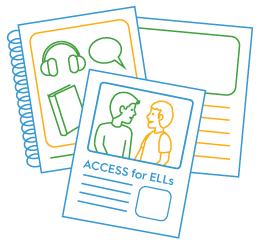Resources/Recursos
Featured Resources



All resources/Todos los recursos
Filter resources by:
Resources/Recursos
ACCESS for ELLs Prueba de desempeño linguístico en inglés
Este informe brinda información sobre el nivel de desarrollo del alumno en la prueba de desempeño linguístico en inglés ACCESS for ELLs.
Detalles del recurso Ver Descargar ahoraReleased February 2023
ACCESS for ELLs Interpretive Guide for Score Reports
This comprehensive document explains the types of scores reported by ACCESS for ELLs for students in kindergarten through grade 12.
Resource Details View Download NowReleased February 2023
Sample Alternate ACCESS Individual Student Report for Educators
This version of the report is for educators and provides information about a student’s scores on the Alternate ACCESS English language proficiency test. This test is based on the WIDA Alternate English Language Development Standards and is used to measure students’ progress in learning English. Scores are reported as Language Proficiency Levels and as Scale Scores.
Resource Details View Download NowReleased February 2023
Supporting Multilingual Learners' Language Growth Through Language Development Portfolios
This Focus Bulletin illustrates how teachers and students can use language development portfolios to interpret and document language growth. The bulletin follows the story of how a grade-level team introduced portfolios to their practice, posing several questions the team asked as they refined their usage. It closes by offering two sample tools that teachers can use and adapt to capture multilingual learners’ language growth using modified Proficiency Level Descriptors (PLDs) from the WIDA English Language Development Framework, 2020 Edition.
Published: December 2022
Authors: Fernanda Marinho Kray, Margo Gottlieb, Lynn Shafer Willner
Released December 2022
WIDA MODEL Flyer
Are you looking for an interim ELP assessment to predict student performance on ACCESS for ELLs? This flyer provides information on why you should try WIDA MODEL.
Resource Details View Download NowReleased August 2022
WIDA ELD Standards Framework, 2020 Digital Explorer
This website serves as a digital database of the WIDA English Language Development (ELD) Standards Framework. It categorizes Language Expectations in two ways: by ELD standard statement and grade-level cluster, and by Key Language Use and communication mode. Proficiency Level Descriptors (PLDs) can be explored by grade-level cluster and communication mode.
Resource DetailsReleased August 2022
ACCESS for ELLs: Entendiendo el puntaje de su niño
Envíe este volante a los hogares con los estudiantes, junto con el Informe individual del estudiante de ACCESS for ELLs. Este folleto provee información sobre cada aspecto de la puntuación incluida en el informe. Utilice esta guía en español para ayudar a los padres a comprender qué significan las puntuaciones y cómo se utilizan.
Detalles del recurso Ver Descargar ahoraReleased July 2022
Using ACCESS for ELLs to Promote Beneficial Outcomes for English Learners Flyer
This flyer provides a breakdown of the role school/district-level educators, state-level administrators and WIDA play in using or developing ACCESS Online and Paper test scores, interpreting scores and making decisions based on scores to best serve English learners. Plus, there’s a checklist outlining the positive and intended outcomes of using ACCESS Online and Paper scores, so you’ll always know what it takes to ensure your students have the supports they need.
Resource Details View Download NowReleased July 2022
Making Science Multilingual: Supporting Equity Through Design Principles
This Focus Bulletin emphasizes how multilingual learners' everyday language can be an asset to science teachers in their efforts to promote classroom engagement. It provides educators with real-world examples and guiding questions to help create learning spaces where sensemaking, co-construction, language development and equity can flourish simultaneously.
Published June 2022
Authors: Rita MacDonald, David Crowther, Jennifer Wilfrid
Released June 2022
Guiding Principles of Language Development Bibliography
Complete list of references cited in the WIDA Guiding Principles of Language Development.
Resource Details View Download NowReleased June 2022
Muestra Alternate ACCESS informe individual del estudiante
Este informe brinda información sobre el nivel de desarrollo del estudiante en la prueba alternativa de desempeño lingüístico en inglés ACCESS. Esta prueba se basa en los estándares alternativos sobre el desarrollo del idioma inglés de WIDA y se utiliza para medir el progreso de los estudiantes en el aprendizaje del inglés. Los puntajes se informan como Niveles de desempeño lingüístico del idioma y como Escalas de puntaje.
Detalles del recurso Ver Descargar ahoraReleased February 2022
Multilingual Children and Their Families
This WIDA Snapshot provides an overview of who multilingual children are, the benefits of promoting home language(s), and initial ideas for developing reciprocal partnerships with multilingual families.
Resource DetailsReleased February 2022
Illustrated Guiding Principles of Language Development: Printable Posters
These posters bring each of the 10 WIDA Guiding Principles of Language Development to life and can be used by educators in classrooms and with parents, families and community members. Each illustrated guiding principle is set up for printing on a color laser printer. The finished printed size is 8.5x11 inches.
Resource Details View Download NowReleased January 2022
WIDA ELD Standards Framework, 2020 Edition - Kindergarten Materials
This resource includes the Kindergarten materials that are part of the WIDA English Language Development Standards Framework, 2020 Edition. The materials specific to this grade level have been pulled together to provide educators of students in Kindergarten with a smaller, more manageable booklet to support their implementation of the WIDA ELD Standards Framework in their classroom.
Resource Details View Download NowReleased October 2021
WIDA ELD Standards Framework, 2020 Edition - Grade 1 Materials
This resource includes the grade 1 materials that are part of the WIDA English Language Development Standards Framework, 2020 Edition. The materials specific to this grade level have been pulled together to provide educators of students in grade 1 with a smaller, more manageable booklet to support their implementation of the WIDA ELD Standards Framework in their classroom.
Resource Details View Download NowReleased October 2021
WIDA ELD Standards Framework, 2020 Edition - Grades 2-3 Materials
This resource includes the grades 2-3 materials that are part of the WIDA English Language Development Standards Framework, 2020 Edition. The materials specific to this grade-level cluster have been pulled together to provide educators of students in grades 2-3 with a smaller, more manageable booklet to support their implementation of the WIDA ELD Standards Framework in their classroom.
Resource Details View Download NowReleased October 2021
WIDA ELD Standards Framework, 2020 Edition - Grades 4-5 Materials
This resource includes the grades 4-5 materials that are part of the WIDA English Language Development Standards Framework, 2020 Edition. The materials specific to this grade-level cluster have been pulled together to provide educators of students in grades 4-5 with a smaller, more manageable booklet to support their implementation of the WIDA ELD Standards Framework in their classroom.
Resource Details View Download NowReleased October 2021
WIDA ELD Standards Framework, 2020 Edition - Grades 6-8 Materials
This resource includes the grades 6-8 materials that are part of the WIDA English Language Development Standards Framework, 2020 Edition. The materials specific to this grade-level cluster have been pulled together to provide educators of students in grades 6-8 with a smaller, more manageable booklet to support their implementation of the WIDA ELD Standards Framework in their classroom.
Resource Details View Download NowReleased October 2021
WIDA ELD Standards Framework, 2020 Edition - Grades 9-12 Materials
This resource includes the grades 9-12 materials that are part of the WIDA English Language Development Standards Framework, 2020 Edition. The materials specific to this grade-level cluster have been pulled together to provide educators of students in grades 9-12 with a smaller, more manageable booklet to support their implementation of the WIDA ELD Standards Framework in their classroom.
Resource Details View Download NowReleased October 2021
Examining English Learner Testing, Proficiency and Growth: Before and Throughout the COVID-19 Pandemic
This report examines English learners’ (EL) testing, proficiency and growth in the academic years of 2018–19, 2019–20 and 2020–21, using population-level data from ACCESS for ELLs Online, administered across the WIDA Consortium to students identified as ELs. The objective of the report is to shed light on the impact of the COVID-19 pandemic on ELs’ educational outcomes.
October 2021
Authors: Narek Sahakyan, H. Gary Cook
Released October 2021




